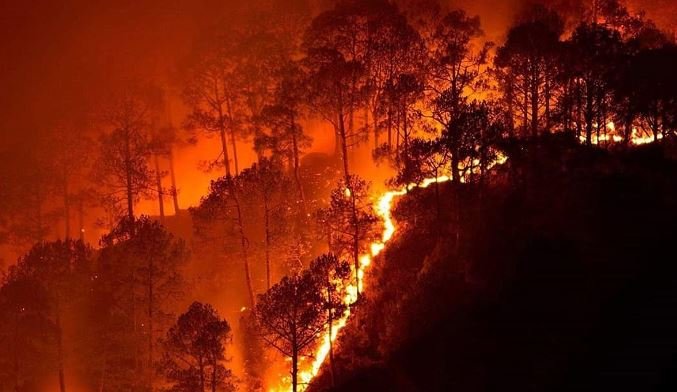The recent outbreak of a massive forest fire in Rajouri district, Jammu and Kashmir, has sparked a profound environmental crisis of unprecedented proportions. This calamity, fuelled by dry weather conditions and high temperatures typical of the summer season, has rapidly engulfed extensive areas of the Kotli and Nagoon forests. The resulting blaze has not only devastated the lush greenery and diverse ecosystems but has also raised grave concerns about its impact on wildlife and the broader environment.
Reports from the ground indicate that efforts to contain the inferno have been hampered by the sheer intensity of the fire and the remote location of the affected regions. Firefighting teams, including personnel from the Forest Protection Force, Forest Department, Social Forestry, and Fire and Emergency Services, have been tirelessly battling the flames. Despite their valiant efforts, the blaze has continued to spread, leaving a trail of destruction in its wake. The consequences of this forest fire extend beyond the immediate loss of vegetation. Rajouri is renowned for its rich biodiversity, housing numerous species of flora and fauna, including several endangered ones. The fire’s rapid spread has forced wildlife to flee their habitats, leading to fatalities among various animal species. This loss of biodiversity not only threatens the ecological balance of the region but also undermines efforts to conserve rare and endangered species. Ecologically, the impact of the forest fire is profound and far-reaching. Forests play a critical role in maintaining soil fertility, regulating local climate patterns, and acting as carbon sinks that mitigate climate change. With large tracts of forest land reduced to ash, the region faces increased risks of soil erosion, compromised water quality, and heightened atmospheric carbon dioxide levels. The long-term recovery of these ecosystems will require concerted efforts in ecological restoration and sustainable forest management practices. The human toll of the forest fire is also significant, affecting local communities that depend on these forests for livelihoods and sustenance. Villages in proximity to the affected areas have experienced disruptions in daily life, with air quality deteriorating due to smoke inhalation. Agricultural activities have been adversely affected, raising concerns about food security and economic stability in the region. While natural factors such as dry weather and lightning strikes contribute to the occurrence of forest fires, human activities often exacerbate these incidents. Issues such as illegal logging, inadequate fire prevention measures, and negligence in forest management practices have heightened the vulnerability of forests to such disasters. Moving forward, there is an urgent need for stringent enforcement of forest laws, enhanced community involvement in fire prevention strategies, and investments in early warning systems to mitigate the risk of future calamities. The response to the forest fire in Rajouri underscores the critical role of governance and policy frameworks in protecting natural habitats and biodiversity. Government agencies must collaborate effectively to enhance firefighting capabilities, implement stricter regulations on land use and forest protection, and promote awareness among communities about the importance of environmental conservation. International cooperation in sharing best practices, technologies, and resources is also essential in building resilience against global environmental challenges.
Last but not least, the forest fire in Rajouri serves as a stark reminder of the fragility of our ecosystems and the urgent need for collective action to protect them. It calls for a renewed commitment to sustainable practices, resilience-building in the face of climate change, and solidarity in safeguarding biodiversity. As global citizens, policymakers, and communities, we must prioritize environmental stewardship, advocate for robust policies, and empower local stakeholders to become guardians of our natural world. Together, we can mitigate the impacts of disasters like the Rajouri forest fire and forge a path towards a more sustainable and resilient future. The crisis unfolding in Rajouri demands our unwavering attention, concerted efforts, and steadfast commitment to safeguarding our planet’s natural heritage.
The Jammu and Kashmir government and the Forest Department must urgently implement a comprehensive strategy to address the aftermath of the devastating forest fire in Rajouri. Firstly, bolstering firefighting capabilities through enhanced training, equipment provision, and regular drills is crucial. Secondly, strict enforcement of forest conservation laws and penalties for illegal activities like logging and encroachment are imperative to prevent future disasters. Thirdly, investing in early warning systems and satellite monitoring technologies can help detect fire outbreaks promptly, allowing for swift response measures. Moreover, fostering community engagement and awareness campaigns on fire prevention and sustainable forest management practices will be pivotal in building resilience. Lastly, allocating sufficient resources for ecological restoration efforts and wildlife rehabilitation is essential for restoring the damaged ecosystems and ensuring long-term environmental stability in the region.




